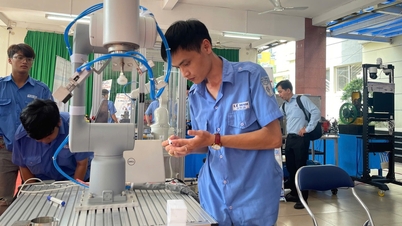Sales, service, collaborator...
As a recent economics graduate (Ho Chi Minh City Open University), Le Thi Uyen Nhi said: "I studied economics but currently work as an administrator for a studio. The job helps me cover my living expenses and practice communication skills, and handle pressure well because I have to meet KPIs every month."
Similarly, Nguyen Phuong Uyen graduated with a degree in international business but currently works as a livestreamer for a Chinese company. "Thanks to this job, I discovered my ability to speak in front of the camera and found it suitable, so I have been working there for more than 2 years now," Nhi said.

New graduates who have not found a job in their field can do something temporary to earn income, but do not forget to improve their knowledge and skills in the field they have studied and seize opportunities.
PHOTO: NGOC DUONG
The reality is that many new graduates have not been able to find jobs in their field. Many new graduates have chosen temporary jobs to cover living expenses and maintain their life during the transition period. These are jobs such as sales, administration, service or content collaborator...
According to Master Nguyen Huu Khang, lecturer at Eastern International University, also a business consultant and marketing expert, this choice comes from many reasons: financial pressure, the desire for independence or the fear of being left behind when friends already have jobs.
Dr. Nguyen Van Kha, Deputy Director of the Admissions and Communications Center of Ho Chi Minh City University of Industry and Trade, said: “For new graduates, having at least one job is necessary. If they do not enter the labor market immediately, students will easily forget their knowledge, lack skills and work attitude. Even a temporary job is an environment to practice all three of these factors.”
However, working “temporarily” for too long also has many potential risks. According to Mr. Khang, with professions that require high expertise such as engineering, information technology or research..., being away from the professional environment can easily cause students to lose knowledge and skills.
In addition, when they get used to a stable income, many students gradually accept their comfort zone, lose motivation to develop and forget the long-term goals they set when graduating. Some students delay returning to their major, leading to missed opportunities in the field they have trained.
Therefore, experts note that young people also need to set clear limits for the "temporary" period, which should usually only last from 3 to 5 months, and proactively determine a long-term direction so as not to lose sight of their career goals.
When expectations are far from reality
The labor market in 2025 is fluctuating strongly. According to the General Statistics Office, the unemployment rate of young people aged 15-24 in the third quarter of 2025 was more than 9%, higher than the same period last year. Many businesses are reducing recruitment or prioritizing candidates with experience, causing many obstacles for new graduates.
Master Nguyen Huu Khang commented: “Many students learn a lot of theory but lack practical experience. When they graduate, they have high expectations, want good salaries, and a great environment while not fully understanding their own abilities. Their job-hunting skills are still weak and outdated.”
At the same time, rapid technological change is making competition even fiercer. Many traditional jobs are being automated, while new positions require skills that are not fully equipped in schools.
According to the report “Breaking the Digital Frontier: Innovations Shaping Vietnam's Transformation” 2024-2025 by Acclime, a business advisory group, with the support of UOB Vietnam, Vietnam currently has a large skills gap in technology-related fields. Up to 43% of surveyed businesses said that lack of skills is the biggest challenge, reflecting students' concerns about competitiveness when entering the job market.
Family is also an influencing factor. Mr. Khang shared: “Parents often invest in their children to study a major and expect them to have a stable income from that major. This invisible pressure sometimes limits their children’s other development opportunities.”
The gap between ability, expectation and opportunity has made many graduates confused between waiting for a job in their field or taking a temporary job to have immediate income. Faced with this reality, the question is: should we wait for the ideal job opportunity, or dare to try to accumulate experience and discover ourselves?
Dare to try so as not to miss the opportunity
According to Master Nguyen Huu Khang, the issue is not whether students should work temporarily or not, but "whether they dare to try to know their own abilities". He said: "Enterprises today value skills, thinking and adaptability more than degrees. They are willing to retrain if candidates show a spirit of learning and a good attitude".
Sharing the same view, Dr. Nguyen Van Kha emphasized: “If we wait for the 'right' job, it will be difficult to determine the timing. Job opportunities do not wait for anyone; only by working, experiencing and interacting, can students accumulate the knowledge, skills and attitudes that businesses need.”
From the above perspective, in the context of a constantly changing labor market and AI technology reshaping many professions, students need to be more flexible in their choices.
Accordingly, experts say that if a “temporary” job helps bring in income, young people should take advantage of their spare time to practice their expertise, avoid losing their skills and proactively seek out development opportunities in the right field. This is also an opportunity to better understand themselves and the labor market. On the contrary, if you feel that your field of study does not really “match” your passion, “trying” in a new field can open up another direction for the future.
Source: https://thanhnien.vn/sinh-vien-moi-tot-nghiep-tim-viec-lam-tam-hay-cho-co-hoi-lam-dung-nganh-185251109132237482.htm



![[Photo] Prime Minister Pham Minh Chinh attends the annual Vietnam Business Forum](https://vphoto.vietnam.vn/thumb/1200x675/vietnam/resource/IMAGE/2025/11/10/1762780307172_dsc-1710-jpg.webp)

![[Photo] Prime Minister Pham Minh Chinh attends the Patriotic Emulation Congress of the Ministry of Foreign Affairs for the 2025-2030 period](https://vphoto.vietnam.vn/thumb/1200x675/vietnam/resource/IMAGE/2025/11/10/1762762603245_dsc-1428-jpg.webp)


























































































![Dong Nai OCOP transition: [Article 3] Linking tourism with OCOP product consumption](https://vphoto.vietnam.vn/thumb/402x226/vietnam/resource/IMAGE/2025/11/10/1762739199309_1324-2740-7_n-162543_981.jpeg)











Comment (0)